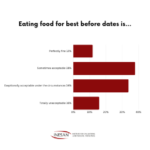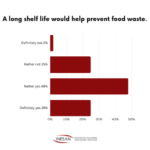
Perceptions of ‘Best Before’ Dates
30. 11. 2023
The Impact of Shelf Life
7. 12. 2023Our survey found that 38% of respondents believe it is sometimes acceptable to eat food past its “best before” date. This statistic highlights a nuanced understanding among consumers that distinguishes between quality indicators and food safety warnings. The ‘best before’ date primarily signals peak quality rather than an expiry date for safe consumption. However, the distinction is not always clear to everyone, leading to unnecessary food waste when products past this date are discarded even though they are safe to eat.
This finding highlights a critical opportunity for consumer education. There is a need to clearly communicate that while expiration dates are useful indicators of quality, they do not always indicate a safety issue. Empowering consumers with this knowledge can lead to more confident decisions about food consumption and reduce waste of consumable goods.
It also opens up opportunities for innovation in food labeling. Such technological solutions, coupled with educational efforts, could significantly improve the public’s understanding and handling of food products in relation to “best before” dates.
For more information about this issue see
https://bit.ly/How_does_packaging_help_consumers_to_reduce_the_quantity_of_food_waste
and
https://bit.ly/Vybrane_postojove_determinanty_predchazeni_vzniku_potravinoveho_odpadu





